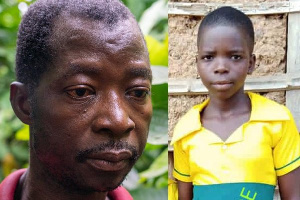A 13-year-old girl was on Friday bitten to death by a snake on a cocoa settlement at Dadieso in the Ellembelle District of the Western Region.
The large cobra, measuring about six feet, bit Juana Jupo Tandor in her sleep at around 0430 hours and she died later at the Nkroful Health Centre due to the unavailability of antivenoms to be administered on her.
Mr Kwasi Tandor, the father of the deceased, said on Friday dawn Juana ran to him in his room and informed him that she had been bitten by a snake, adding; “I went in and saw a large six feet cobra coiled under her bed.”
“I immediately called cocoa farmers nearby for help. We mobilised and killed the snake. We live far away, so we called a motorcycle, which transported us through a dense forest to the Nkroful Health Centre,” he said.
Narrating the incident to Mr Isaac Morkeh Cudjoe, the Assembly Member of the Ankobra Electoral Area, and Mr Muntaka Chasant, a Researcher and Environmentalist, who visited the family to console them, Mr Tandoh said he was asked to travel to Esiama to buy antivenoms to be administered on his daughter.
However, midway on his journey, he was called and informed that Juana had died, he said.
Showing the carcass of the cobra to his guests, the teary Mr Tandor called on the Government to help address venomous snake exposure on cocoa farms in the area.
“We come face to face with dangerous snakes daily on our cocoa farms. The risks in cocoa farming around this area are very high with little reward,” he said.
Mr Morkeh Cudjoe, the Assembly Member, called on the Government and the Ghana Cocoa Board to consider snakebite envenoming as one of the major challenges facing the cocoa production sector, and start education and awareness programmes on its management.
He urged the global chocolate manufacturing companies to consider funding snakebite research in cocoa farming communities and dedicate resources to helping rural hospitals stock effective antivenoms.
“Cocoa farming communities around the Ankobra area lack schools, roads, medical facilities, and even motorized canoes to bring them to the nearest towns to access health services,” he said.
“We need a medical facility to cater for the needs of the cocoa farming communities along the Ankobra River. To access healthcare facilities, they must wait for canoes or walk for hours to the nearest town.”
“Young Jupo’s life could have been saved if there was a medical facility nearby instead of scrambling for a motorcycle and traveling for a long distance through the forest to Nkroful.”
Mr Chasant, who documents snakebite envenoming as a neglected public health crisis, on his part, explained that exposure to venomous snakes was a daily occurrence in cocoa farming communities in the Western Region, and that farmers chasing after snakes with cutlasses and sticks fuelled snake aggression towards them.
He noted that cocoa farmers, their families, and other agricultural workers faced threat of snakebite as a daily occupational hazard.
“Just when I arrived, a cocoa farmer showed me two vipers he had killed the day before. We later spotted the aggressive western green mamba slithering on a cocoa tree branch,” Mr Chasant said.
“Besides earning far below the World Bank’s extreme poverty line of $1.90 per day, cocoa farmers in the southwest of Ghana are exposed to some of the most venomous snakes in Africa, including western green mambas, boomslangs, black-necked spitting cobras, and vipers.”
“It is depressing to consider that the farmers, who risk their lives to grow cocoa beans, are far below the poverty line and are likely to be killed by a green mamba in an attempt to pluck a cocoa fruit to feed the over $100-billion global cocoa and chocolate industry.”
Mr Chasant said cocoa farmers in Ghana worked so hard to earn millions of dollars for the country, yet they and their families were often the poorest of the poor.
“Availability and accessibility of antivenom is a major issue in these cocoa farming communities. Depending on the number of vials required, the cost of antivenoms could sometimes be equivalent to several months of a farmer’s income,” he said.
“This is one of the reasons why a lot of them do not immediately seek health care, which increases the chances of death, amputation, and other permanent disabilities resulting from snakebite.”
According to the World Health Organisation, snakebite envenoming is responsible for around 81,000 to 138,000 deaths, worldwide, each year.
Source: GNA
 Home Of Ghana News Ghana News, Entertainment And More
Home Of Ghana News Ghana News, Entertainment And More





